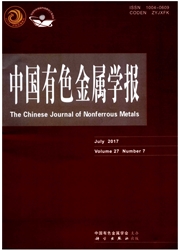

 中文摘要:
中文摘要:
采用Gleeble-3500热模拟机研究6013铝合金在613~773 K、0.001~10 s-1下的平面应变流变力学行为。基于热传导对材料变形热效应的影响,优化材料变形温升的计算方程,分析变形能及热传导对实测流变应力误差的影响。结果表明:热传导对变形温升的影响不可忽略,其影响随着真应变的增加和应变速率的降低而更加显著;通过热传导对变形温升的修正,变形温升随变形能的增大呈非线性变化趋势;在较高应变速率和较低变形温度下,变形能及热传导对材料变形温升及稳态流变应力的影响明显;可用包含Zener-Hollomon参数(Z)的本构方程预测6013铝合金在不同变形条件下的流变应力峰值,其热变形激活能为364.48 kJ/mol;修正的实测峰值应力与预测值的吻合程度有所提高,平均相对误差为5.54%。
 英文摘要:
英文摘要:
The hot plane compression deformation behavior of 6013 aluminum alloy was investigated on Gleeble-3500 thermal-mechanical simulating tester in the temperature range from 613 to 773 K and strain rate range from 0.001 to 10 s-1. The mathematical expression of temperature rising is optimized based on the influence of the heat conduction during hot deformation. Meanwhile, the effects caused by deformation energy and heat conduction on the measured stress errors were analyzed. The results show that the influence of heat conduction cannot be neglected and becomes more obvious with increasing true strain and decreasing strain rate. The relationship between the change of temperature rising corrected by heat conduction and deformation heating is nonlinear. The temperature rising and the steady flow stress are seriously affected by deformation energy and heat conduction during higher stain rate and lower temperature. The peak flow stress can be represented by the Zener-Hollomon parameter (Z) in the hyperbolic sine equation with the hot deformation activation energy of 364.48 kJ/mol. The corrected measured value exhibits a better agreement with the flow stress predicted by the constitutive equation, and the average relative error is 5.54%.
 同期刊论文项目
同期刊论文项目
 同项目期刊论文
同项目期刊论文
 Simulation on dynamic recrystallization behavior of AZ31 magnesium alloy using cellular automaton me
Simulation on dynamic recrystallization behavior of AZ31 magnesium alloy using cellular automaton me Deformation Microstructures of Mg-3Al-1Zn Magnesium Alloy Compressed Over Wide Regions of Temperatur
Deformation Microstructures of Mg-3Al-1Zn Magnesium Alloy Compressed Over Wide Regions of Temperatur A Comparative Study on Modeling of High Temperature Rheological Behavior of AZ80 Magnesium Alloy Usi
A Comparative Study on Modeling of High Temperature Rheological Behavior of AZ80 Magnesium Alloy Usi Accurately Predicting High Temperature Flow Stress of AZ80 Magnesium Alloy with Particle Swarm Optim
Accurately Predicting High Temperature Flow Stress of AZ80 Magnesium Alloy with Particle Swarm Optim 期刊信息
期刊信息
